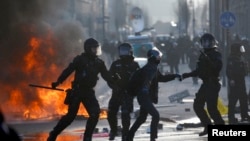Police clashed with anti-austerity protesters Wednesday outside the new headquarters of the European Central Bank (ECB) in Frankfurt, ahead of a ceremony marking the opening of the twin-tower building.
14 police officers sustained minor injuries from stones hurled by demonstrators. Dozens of others were hit by irritating gas or unidentified liquids, but recovered and later in the day were back on duty.
Police said that about 350 people were arrested, while the majority of about 10,000 protesters marched peacefully.
Rally organizers said that more than 100 protesters were hurt by tear gas and pepper spray.
Protesters said they were targeting the central bank for its role in imposing austerity measures to restrain spending and reduce debt in financially troubled countries like Greece.
German leaders condemned the violence, but defended the right of activists to protest against the ECB. "No one has the right to endanger the life of police and fire officials," Finance Minister Wolfgang Schaeuble said to reporters in Berlin.
Despite the violence, the ceremony went ahead as planned. ECB President Mario Draghi said that the new offices for the Eurozone monetary authority are a symbol of what Europe can achieve.
He rejected the charge that the bank had been responsible for the economic suffering experienced by some Europeans, saying its actions have "been aimed precisely at cushioning the shocks suffered by the economy."
The “Blockupy” movement, named after the Occupy Wall Street movement in 2011, says it represents grass-roots critics of multinational financial institutions including the "troika" - the European Central Bank, the European Commission and the International Monetary Fund - whose inspectors monitor countries that have received international bailouts.
The ECB is also influential as a provider of finance to the banks of struggling countries and has in recent weeks sanctioned extra emergency funding to Greece's lenders.
Greek Finance Minister Yanis Varoufakis last week criticized the ECB's policy towards Athens as "asphyxiating", a criticism also made by the protest organizers.





